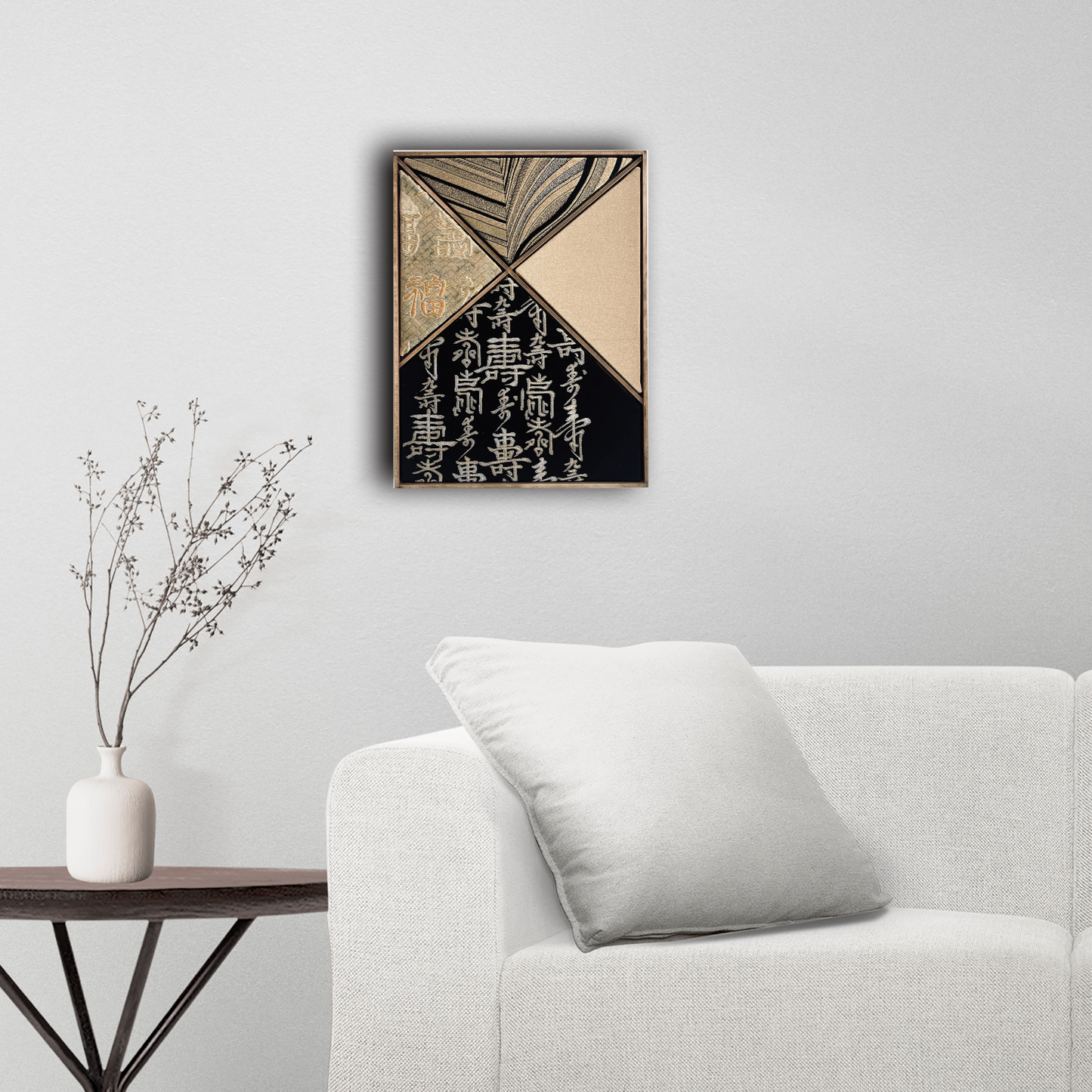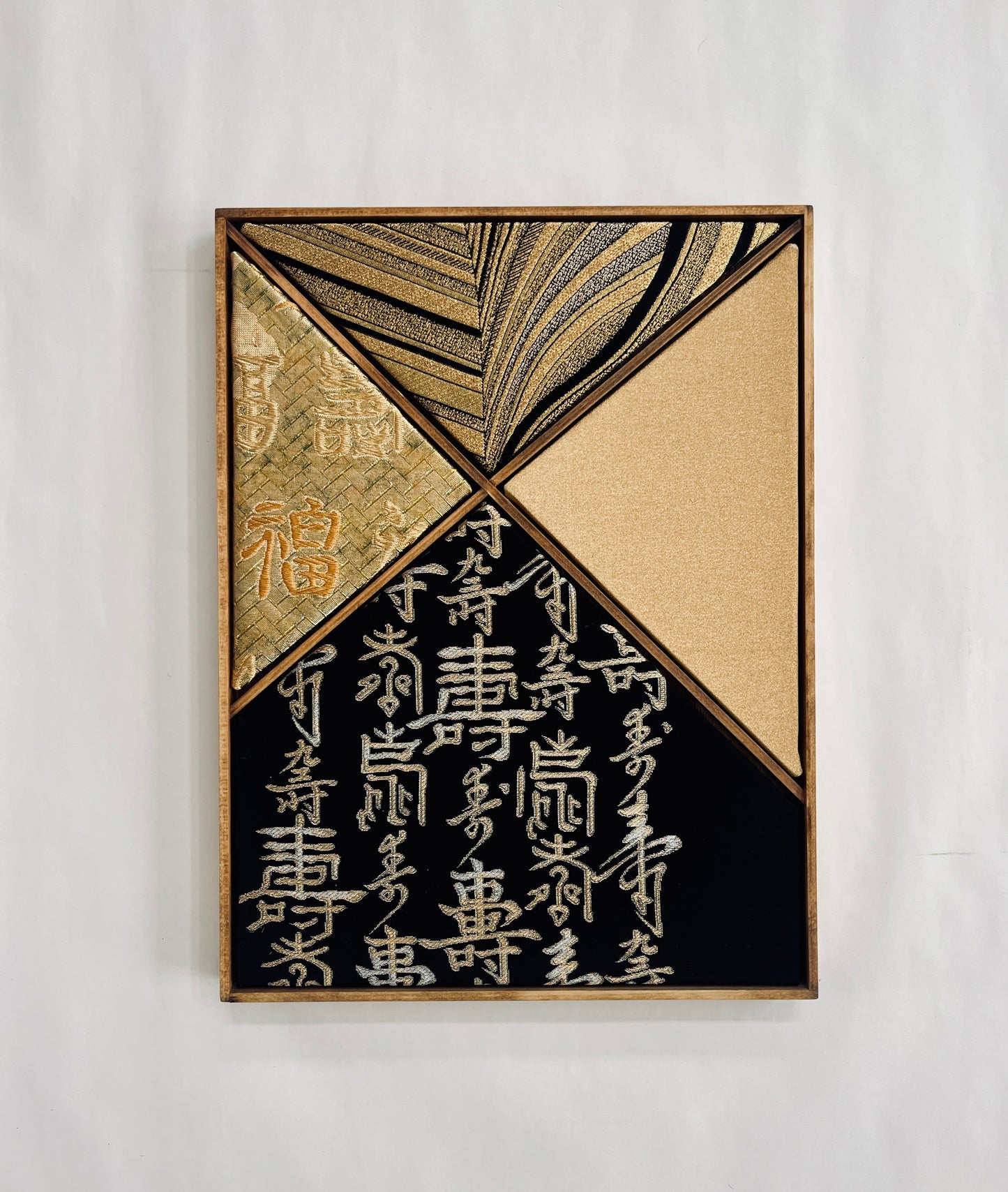Geometry ~Happiness and Longevity~
Geometry ~Happiness and Longevity~
受取状況を読み込めませんでした
Size
30 x 40 x 4cm
Materials
silk (outside-layer) , wooden frame (paulownia)
Story behind the work
This work is inspired by traditional Japanese colors symbolism, and is framed in paulownia wood originally used for a kimono chest-of-drawers.
It is elegantly framed with paulownia wood originally used for kimono chest-of-drawers, and is filled with storytelling and sense of luxury.
I used pieces of kimono that could no longer be used as clothing and kiritansu chest-of-drawers that would normally be discarded to create the ultimate upcycled piece.
Explanation and meaning of pattern and colors
In Japanese culture, the characters "福寿" (pronounced as "fuku-ju") hold significant symbolic meanings:
-
福 (Fuku): This character represents "good fortune" or "luck." It embodies the concept of blessings, prosperity, and happiness. In Japanese culture, the pursuit of good fortune is deeply ingrained, and the character "福" is commonly seen on various items, decorations, and artworks, especially during festive occasions like New Year's celebrations.
-
寿 (Ju): This character signifies "longevity" or "long life." It represents the desire for a healthy and extended lifespan. The character "寿" is often associated with celebrations of longevity, such as milestone birthdays or honoring elderly family members. It reflects the value placed on longevity and the wish for a fulfilling and prolonged life.
Together, the combination of "福寿" symbolizes a wish for both good fortune and longevity. It is often depicted in artwork, calligraphy, or decorative items as a way to convey well-wishes and blessings for prosperity, happiness, and a long, healthy life. The motif of "福寿" is commonly seen in various contexts, including gifts, decorations, and traditional celebrations, reflecting its significance in Japanese culture's ethos of auspiciousness and reverence for life's blessings. On the black obi used in bottom part and golden obi used in left part of this art work you can see different calligraphic variations of these characters.
Characteristics of the fabric
All the materials used here are taken from vintage obi belts.
About the frame
Kiritansu - chest-of-drawers for kimono, is traditionally made from paulownia wood, a uniquely Japanese material closely tied to the world of kimonos.
Paulownia wood is known as the lightest wood in Japan, prased for its natural luster, resistance to moisture, and resilience against cracking. Since ancient times, it has been used in crafting furniture, chests, and musical instruments.
During the Edo period, it became customary to store cherished kimonos in paulownia chests, which offered fire resistance and protection from moisture and insects.
Traditionally, when a daughter was born, a paulownia tree would be planted. Upon her marriage, the tree would be cut down, and the wood would be used to craft a chest for her as a wedding gift.
Following the Ansei Earthquake during the late Edo period in 1855, paulownia chests gained popularity due to their ability to withstand fires and even float in water, thereby safeguarding their contents during floods.
I use antique kiritansu that can’t be used as furniture anymore to create basis and frames for my works. It adds them even more authentic atmosphere of traditional wabisabi spirit. Can you feel it?
Decoration Advice
Canvas can be displayed on a table, wall, etc. Hanging on a wall requires hooks, tacks or nails. It can also be displayed propped up on an easel. Ideal for a room makeover, housewarming gift, present, or souvenir for a loved one.
Precaution
All the works are made from real kimonos, antiques and vintages. For this reason, the fabric may have traces of long-term use and minor fabric damages. In case there are any scratches or stains, we always add a photo of the area on the item page, so please check before purchasing. Regarding precaution, cancellation and refund policy, please refer to the refund policy in the footer section of the site for information.
シェア




